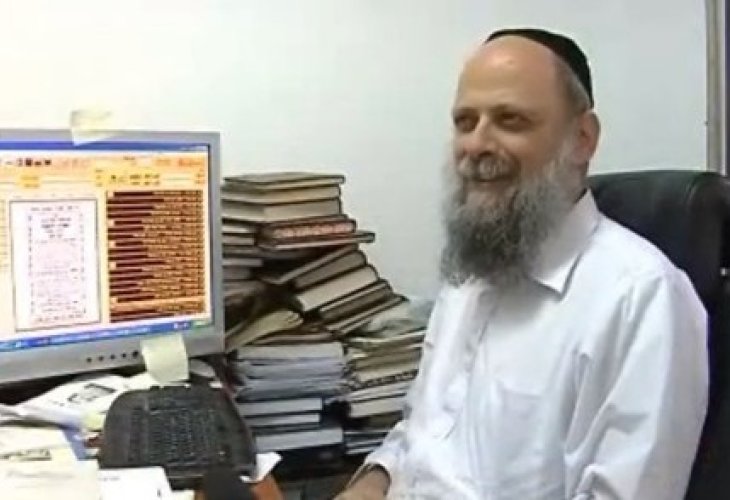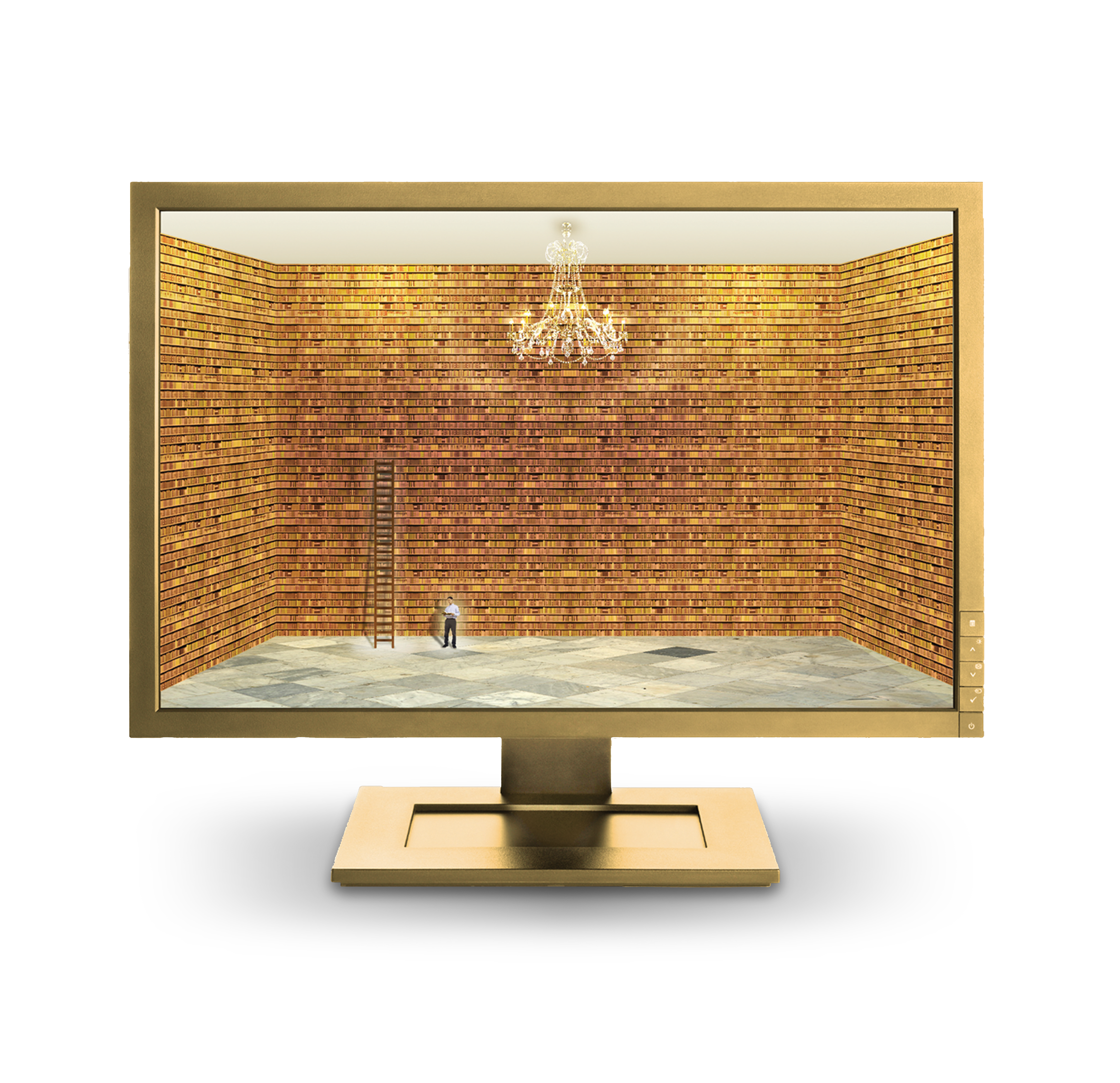The Visionary Behind 'Otzar HaHochma': 'We Worked an Entire Year in Shifts, Never Resting'
How did a young man's dream become a massive project? What challenges did he face along the way? R'Erez Sela, CEO of Otzar HaHochma, shares insights about the unique project he founded and has been nurturing for the past fifteen years.
 Erez Sela, CEO of Otzar HaHochma
Erez Sela, CEO of Otzar HaHochmaAlmost every yeshiva student, seminary girl, teacher, or even private individuals know that moment when they need a specific book for study. Whether it's for looking up a halacha, finding a quote for a paper, or tracing the source of a Midrash, needs such as these arise frequently.
In the past, this could have been a complex task, as browsing through books can be time-consuming. However, since the establishment of 'Otzar HaHochma' around fifteen years ago, things have become much simpler and easier. Otzar HaHochma is essentially the world's largest digital Jewish library, containing 90,200 Jewish books, all scanned page by page in their original form.
Today, using such a database seems natural. Perhaps this is why it feels a bit strange to think that when the idea was first conceived, sixteen years ago, it truly emerged from nothing.

A Revolutionary Idea
'Otzar HaHochma' was initiated by R' Erez Sela, who was born in Kibbutz Megiddo and returned to religious observance after completing his army service (37 years ago). "I studied at Ohr Somayach Yeshiva," he recounts, "which at the time was a flagship yeshiva for those returning to religion. After marrying my wife, Beshmat—who also returned to religion—I moved to study at the Kolel of the Hasidic Yeshiva Chachmei Lublin, where I began my scholarly path in writing and enhancing Torah literature."
Today, after diving deeply into Torah scholarship and possessing the largest collection of Torah books in the world, R' Erez wishes to send a message to those returning to religion: "Do not fear, plunge into the deep waters. We have special divine assistance to skip stages. We also have something to contribute not only in therapy, arts, and alternative medicine but indeed in the world of Torah. Do not be afraid to raise your voice in the Torah field."
How did the project you lead truly start?
"I always had a love for books and writing," R' Erez shares. "One of my childhood dreams was that when I grew up, I would sit by a big desk and write. Interestingly, this was the dream that eventually came true.
"After marrying, I studied at the Kolel through the Shas program for several years," he adds. "When I came to study Masechet Nazir—a tractate barely touched by commentators—I felt it was time to start writing. So for about four years, I studied and wrote a commentary on Masechet Nazir. Writing naturally required many books, which led me to visit numerous libraries, where I found old books and manuscripts that greatly assisted me in writing the commentary."
In the following years, R' Erez honed his skills and worked on other writings, simultaneously establishing a publishing house that released important books like 'Pnei Yehoshua' and 'Chidushei HaRitva on the Shas' in new editions based on manuscripts and various prints, complete with notes, references, and more.
But where did Otzar HaHochma originate from?
"The initiative for Otzar HaHochma started with an idea that came to my mind while managing the publishing house. I decided to publish a facsimile edition of the first Shas printed in Venice about 500 years ago. It had enormous demand, much more than expected. This immediately led to the next idea—to release a series of an old book called 'Dikdukei Sofrim,' which contains variations on the Shas. This too had great demand, and from there, the path to 'Otzar HaHochma' was short."
In practice, R' Erez says, the turning point came when his good friend—Rabbi David Aaron Sofer—suggested an revolutionary idea: Instead of physically printing books, scan them and distribute them digitally. This idea completely captured me, and I approached the project with great enthusiasm.
This is a massive project requiring endless investment; were there no fears or concerns?
"Of course, at first, everything started in a very amateur manner. I had never before been involved in photography or scanning, certainly not programming. The truth is, at the time, I also didn't understand the scale of the financial investment involved. I suppose that had I known the complexities and financial challenges involved, I would likely have abandoned it from the start."
How did you acquire the books for the project?
"Initially, we sourced the books from various friends' libraries. We would go to libraries at night, fill boxes with books, bring them to rented offices, and hired workers would catalog, photograph, and process the images. We began with small, private libraries, and later moved to larger ones, such as the large library of Chachmei Lublin Yeshiva. Once we finished there, we continued to the library of Yad HaRav Herzog, followed by the library of Mosad HaRav Kook, and so on."
R' Erez notes that since the start of the photography phase, about a year passed before the first version was released. "But it was an absolutely crazy year, with nonstop work in shifts. Throughout the entire year, we never imagined that in addition to searching for specific books in the database, we'd also be able to search for specific words appearing within the books' contents, as how could one perform a 'word search' in a photographic image? However, about a month before the first version was supposed to come out, we had a particular idea for creating a search mechanism using special technology. We worked on this for a month before releasing the first version."
Were there challenges along the way?
"Absolutely," R' Erez affirms candidly, "There were many challenges along the way, as with any new project, but I believe the greatest challenge was realizing that the thousands of books we had photographed couldn't enter the software due to copyright issues."
That's such a fundamental issue; how did you overlook it initially?
"We did think about it, but we didn't fully understand its implications. We assumed that authors wouldn't mind and would be glad. We had similar notions, but when it came down to it, we realized we couldn't just summarily include all books. So, we started contacting each author to ask for their permission.
"This in itself became a project. To this day, residues from those days linger, with over a thousand books still not included because we haven't yet reached out to the rights holders."
Secrets Behind the Project
Are there specific books that you felt were particularly important to include in the project?
"It's hard for me to say," says R' Erez, "because almost every book holds specific importance for certain individuals, each according to their field, so we strive to include as many books as possible from the outset. However, there are books that are particularly important to include in Otzar, such as reference books, foundational texts, or important works in various fields."
R' Erez prefers not to name specific titles but shares this anecdote with a smile: "There was a particular book that isn't a study book but rather a reference guide. We asked the rights holder to include this book in Otzar HaHochma, and he refused, claiming the book sold for more than 100 shekels and he still had unsold copies. He feared that once the book entered Otzar HaHochma, all remaining copies would forever stay in storage."
R' Erez emphasizes that he knew it was an old book, printed decades ago, yet he offered the author this proposal—"I told him we would purchase all the old, dusty copies he still had, to make him agreeable to adding the book to Otzar HaHochma. About two hundred books, which incidentally, are still sitting in our office today."
But you can't ignore the fact that the author's concerns have merit. Aren't personal libraries obsolete once the books are available on a disc?
"Look, there are two sides here. On the one hand, Otzar HaHochma indeed makes the home library somewhat redundant, especially books that aren't strictly for study. But on the other hand, speaking from daily experience, I often find it more convenient and friendly to open a physical book and browse through it. Many times, I regret not having the book to grab off the shelf and have to go to another room, turn on the computer, and print out the needed page to study it. Not to mention studying on Shabbat, when one needs to refer to a book and can't access the computer.
"In any case, after years of experience, we see that the financial loss is minimal, if it exists at all, whereas, on the other hand, most authors find it far more important that their books are distributed and studied."
And since you also use 'Otzar HaHochma,' and not just produce it—could you give us a tip for efficient use of the database?
"I want to give a seemingly simple tip, but from my experience, not everyone is aware of the many fundamental options in 'Otzar HaHochma.' Take, for instance, the free search feature. We intentionally installed a mechanism that allows searching for words within books, and this isn't just a standard search; it includes many options, and it's worth getting to know them.
"Also, there's the option concerning the Shas tractates, meaning selecting a specific page or folio from the Shas, and displaying all commentaries automatically opened on the selected page. This is another feature not everyone is aware of.
"We are also developing the idea of tutorial groups for Otzar HaHochma, where we can explain to our customers all the options and features. This should definitely be helpful."
Finally, reveal to us your plans and aspirations for the future
"Our aspiration, of course, is to add more and more books as much as possible and to improve the software year by year as we have done in previous years.
"In addition, we are now developing a new project based on the foundations of Otzar HaHochma, which is a massive digital commentary archive on the Shas. The idea is simple: one selects a page in the Shas, clicks on a line in the Gemara, Rashi, or Tosafot, and automatically receives a display of all the commentators discussing that segment or line. This is a huge project involving colossal financial and manpower investments, and we hope to succeed by the grace of Hashem."

